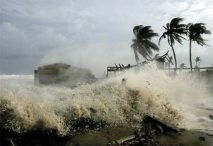“As the countries most vulnerable to climate change, we are always mindful that a weak deal could be worse than no deal at all.”
Bonn, Germany—Ahead of the latest United Nations climate change talks, the final round before the international community tries to reach agreement on a highly-anticipated treaty next month, Thoriq Ibrahim, Maldives’ environment minister and chair of the Alliance of Small Island States (AOSIS), released the following statement on behalf of its members:
“As if further evidence was needed to illustrate the urgency of the climate crisis, we begin talks as yet another devastating storm churns over the Philippines. At the same time, one of our members – the Bahamas – has been forced to rebuild in the aftermath of Hurricane Joaquin, which battered the islands for 3 days, washing away scores of homes and flooding countless acres of agricultural land with salt water, caused at least $60 million USD in damage. This, of course, is only a preliminary estimate and does not include the significant costs of climate proofing for future events.
“What’s more, for only the third time in recorded history, a massive coral bleaching event that spans the globe is now underway and could result in the loss of more than 12,000 square kilometers of coral this year alone.
“To be sure, the Convention categorically recognizes the unique vulnerability of small islands to these and many other life-altering climate impacts. It is unacceptable, even reckless, that the co-chair’s text rewrites such a fundamental provision, especially in light of the increasingly frequent and often deadly extreme weather events we are witnessing today.
“Few are more acutely aware of the vanishingly little time remaining to adopt a climate treaty than our members and we will engage in the co-chair’s draft as agreed. But the current text neither satisfies the concerns of all parties nor would it lead to the actions required to avert a global calamity. As the countries most vulnerable to climate change, we are always mindful that a weak deal could be worse than no deal at all.
“To achieve the objectives of the Convention and protect the interests of all our members, the Paris package must contain the following elements:
“First, it must include ambitious commitments from all parties coupled with a robust process that drives even bolder actions year after year and in line with keeping the rise in global average temperature below 1.5 degrees Celsius.
“Second, as the latest storms and catastrophic coral bleaching event so graphically illustrate, climate change is already happening and it will only get worse in the years to come. Some impacts cannot be addressed through adaptation at all. To address sea level rise, ocean acidification, and other severe impacts, an international mechanism on Loss and Damage must be a central and distinct element of the Paris package and lead to action.
“Finally, we know that tackling climate change and adapting to its impacts will require a minimum of $100 billion USD per year by 2020, and scaling up from this level post-2020 in a transparent and predictable way, including public, grant-based support for adaptation.
“We are staring at a once-in-a-generation opportunity to tackle climate change in Paris. But a final agreement is by no means assured and recent history makes it clear that success will require compromise, yes, but one that reflects the views of all parties—especially the most vulnerable.”
###
